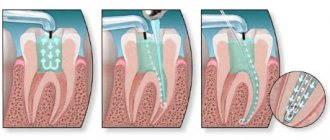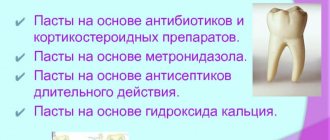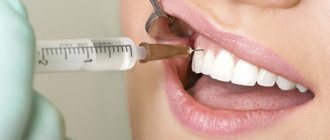Where is calcium found?
Indeed, in the human body, calcium is mainly found in bone tissue, tooth enamel and dentin - the basis of teeth. In total, 99% of it is there. And only one percent of this mineral is found in other tissues - muscles, blood, intercellular fluid. But this one percent is very important: it ensures muscle contraction, including the heart muscle, regulates the functioning of the nervous system, participates in the process of blood clotting, and helps the endocrine system. And therefore, if the body lacks it, it comes from the bones, which are a kind of storage of this element.
Proper nutrition: calcium for dental health
Lack of calcium in the body leads to multiple health problems, and affects not only the condition of the teeth. A sufficient amount of this macroelement is responsible for the health of the endocrine and cardiovascular systems. Calcium regulates processes occurring in the nervous system and affects blood clotting. If a person does not receive enough of this substance, then the body independently solves this problem by obtaining calcium from the bones.
You can eat many foods high in calcium, but this will not help improve the health of your teeth or slow down tooth decay. However, following the rules of a healthy diet, drawing up a daily diet taking into account all vital vitamins and macroelements is important in order to maintain your body and not aggravate the situation.
Will calcium supplements help strengthen teeth?
When it comes to adults, dentists answer this question in the negative. After all, calcium accumulates in the tooth tissue during its formation. And that’s when it is needed to strengthen teeth. When this process is over and the tooth has erupted, neither calcium nor other minerals enter the dental tissue from the blood.
In other words, you can take calcium supplements or eat cottage cheese and cheese every day, but you won’t be able to strengthen your teeth this way - they were fully formed in your childhood.
Nevertheless, dentists recommend eating a little cheese after a “sweet” meal. And although calcium from it will not get into the tooth enamel, cheese promotes the appearance of saliva, which cleanses the oral cavity. In addition, the calcium contained in cheese neutralizes the acidity of saliva, which prevents the destruction of enamel.
As for calcium supplements, they should be taken after consultation with a doctor, who can determine the lack of this element in the body.
Calcium content in foods: replenishing calcium deficiency
Macronutrient deficiency can manifest itself in different ways. Here are its main features:
- Brittleness of nails.
- Hair fragility and loss.
- Dryness and itching of the skin.
- Pain in muscles, joints.
- A tingling feeling in the muscles.
- Frequent seizures.
- Loss of energy, lethargy, chronic feeling of fatigue and drowsiness.
If you notice signs of calcium deficiency, you can compensate for the deficiency by adjusting your daily diet.
Calcium is found in milk and dairy products (yogurt, cheese). But what about people who don’t use them? You should know that this macronutrient is also present in other products.
Fish and seafood are known for their beneficial properties. The beloved sardine in oil can rightfully be considered a storehouse of calcium. 100 grams of this canned food contains 383 mg of macronutrients. There is also calcium in shrimp. There are 90 mg of calcium per 100 grams of shrimp.
Calcium is also found in products of plant origin. The record holder among them is sesame. 100 grams of seeds contain 780 mg of calcium. One serving of white beans (approximately 175 ml) contains up to 141 mg of the macronutrient; beans contain slightly more - 194 mg. 100 grams of almonds contain 263 mg of calcium. Cauliflower will replenish 95 mg of calcium in the body with one 125 g serving. Broccoli also contains this macronutrient: 47 mg of calcium per 100 grams.
Good news for those with a sweet tooth is the information that calcium is also found in chocolate. By choosing a 100 gram milk chocolate bar, you will get up to 240 mg of calcium. But here it should be remembered that sweets in themselves are not good for teeth, so you should not choose chocolate as the only source of this macronutrient.
When introducing foods rich in calcium into your diet, you should know that it is not absorbed by the body by itself. To achieve the desired effect, it is necessary that other beneficial substances and vitamins enter the body. In particular, vitamin D3 is responsible for the absorption of calcium (on average, it needs 0.636 mg per day).
Is calcium washed out of teeth during pregnancy?
This is a very common opinion: it is believed that the unborn baby “takes” calcium from the mother’s teeth, and it is from this that the bones of the fetus are formed. This is the cause of tooth decay, which often occurs during pregnancy. However, doctors do not share this opinion.
Yes, the baby growing in the mother’s belly really needs calcium in order for its tissues to form correctly. And therefore, during pregnancy, a woman should receive a sufficient amount of this element. But it has not been proven by science that the mother’s teeth suffer due to its deficiency.
In fact, if there is insufficient calcium intake during pregnancy, the baby's risk of tooth decay increases later. This has been confirmed by studies in which pregnant women regularly took calcium supplements. In the future, the children of these women had less caries than their peers whose mothers did not receive calcium.
This means that pregnant women need to take calcium to ensure that their baby has strong teeth in the future, not to keep their own teeth healthy.
But what about the fact that after the birth of a child, many mothers experience dental problems? Doctors explain this for other reasons. For example, during pregnancy a woman often vomits. At the same time, the acid content in the mouth increases, which affects the enamel, destroying it. To avoid this, you need to rinse your mouth thoroughly after vomiting, but you should not brush your teeth, mechanically irritating the enamel.
Another reason for tooth damage during pregnancy may be insufficient hygiene associated with gum inflammation - gingivitis, which develops in a woman under the influence of hormonal changes.
Poor nutrition, in particular a passion for carbohydrate foods, untreated caries before pregnancy, and tartar if a woman neglects to brush her teeth at the dentist also contribute.
Calcium gluconate, solution 100 mg/ml, ampoules 10 ml, 10 pcs.
The drug is heated to body temperature before administration. The drug is administered deeply intramuscularly or intravenously slowly (over 2-3 minutes), or by drip, to eliminate the possibility of local irritation or necrosis if the drug enters the perivascular tissue. Intravenous injections should be carried out under close monitoring of heart rate and electrocardiogram, since bradycardia with vasodilation and arrhythmias may occur if calcium gluconate is administered too quickly.
With intravenous administration, a feeling of heat throughout the body is possible, which quickly passes. Due to the risk of local irritation, intramuscular injections should only be performed if intravenous injection is not possible. Intramuscular injections must be performed deep enough into the muscle, preferably in the gluteal region. For obese patients, a longer needle should be selected to ensure safe insertion into muscle rather than fat tissue. If repeated injections are necessary, the injection site should be changed each time.
During treatment, it is necessary to carefully monitor the concentration of calcium in the blood plasma; when administered in high doses, additionally monitor the rate of calcium excretion in the urine.
When intravenously administered calcium gluconate, in exceptional cases, patients receiving cardiac glycosides require monitoring of cardiac activity and conditions should be provided for emergency treatment of cardiac complications, such as severe arrhythmias.
Calcium salts should be used with caution and only after carefully determining the indications in patients with nephrocalcinosis, pathology of the cardiovascular system, sarcoidosis (Beck's disease), in patients receiving epinephrine, in elderly patients.
Renal dysfunction may be associated with hypercalcemia and secondary hyperparathyroidism. Therefore, in patients with impaired renal function, parenteral administration of calcium gluconate should be prescribed only after careful determination of indicators, and it is necessary to monitor the calcium-phosphate balance.
When used simultaneously with other drugs, medical supervision is required.
The solution is used only if it is transparent and the ampoule is not damaged. The drug is diluted immediately after opening the ampoule. When diluting the drug, strict adherence to aseptic rules is required. From a microbiological safety point of view, the diluted drug should be used immediately. The ampoule is for single use only. The exception is dilutions prepared under controlled aseptic conditions. After preparing the solution, the terms and conditions of its storage before administration are the responsibility of the user and should be no more than 24 hours at a temperature of 2 to 8 ° C. The remaining unused volumes of the drug must be destroyed.
Impact on the ability to drive vehicles and machinery
During the treatment period, care must be taken when performing potentially hazardous activities that require increased concentration and speed of psychomotor reactions (driving vehicles, working with moving mechanisms, working as a dispatcher and operator).
Does calcium help maintain teeth in old age?
Yes, in old age, taking calcium supplements helps preserve your teeth. A study was conducted that confirmed this fact. So, two groups of people after 65 years of age took three years in a row: the first took calcium supplements and vitamin D, the second took a placebo (“dummies”). After this, the subjects were observed for another two years. It turned out that in the first group people lost teeth less often than in the second. But this is not due to the fact that calcium makes teeth stronger. Here, the main role was played by strengthening the jaws, and consequently, better fixation of the tooth in the jaw.
Solutions
Remineralizing solutions are preparations containing macro- and microelements necessary for the mineralization process. The mineralizing components included in solutions for local caries prevention are represented by compounds of fluorine, calcium, phosphorus and other trace elements. Such solutions can be used in the form of rinses and mouth baths by the patient himself at home or in children's organized groups (fluoride-containing mouth rinses are presented above). However, their use in the form of applications, electrophoresis and phonophoresis on the surface of teeth is more effective. A significant number of formulations of remineralizing solutions have been proposed. Without going into detail about their review, we will present the most widely used at present. Fluorine-containing solutions for applications, electrophoresis and phonophoresis, as a rule, contain fluorine compounds such as sodium fluoride (0.2%, 1-2%), tin fluoride (8-10%), sodium monofluorophosphate, potassium fluoride, amino fluorides. Calcium preparations for applications and electrophoresis include calcium gluconate (10% solution), calcium glycerophosphate (2.5%), and calcium chloride (10%). Preparations containing phosphorus are represented by sodium monofluorophosphate and sodium salt of hexaphosphoric acid. Calcium ions and phosphate ions should be added to the composition of remineralizing solutions in such a concentration that saliva is a supersaturated solution. The optimal ratio of calcium and phosphate in solution is 1:1.6 or higher. Complex remineralizing solutions include Remodent and Profocar. The drug Remodent was developed at the Riga Medical Institute in 1975 by G. N. Pakhomov, E. V. Borovsky, A. Ya. Luste and is currently registered in 11 countries around the world. Remodent powder is highly purified bone meal from the jaw bones of young cattle, obtained by lyophilization or vacuum drying. Remodent composition: calcium - 4.35%, phosphorus - 1.36%, magnesium - 0.15%, potassium - 0. 20%, sodium - 16.0%, chlorine - 30.0%, organic substances - 44.0%, manganese, iron, zinc, copper and other trace elements - up to 100%. The drug is available in the form of powder, tablets and granules, is included in tooth powders, pastes, gels, solutions. A 3% solution of Remodent powder is used for applications and mouth rinses (15-25 ml of solution per rinse) 1-2 times a week for 10 months a year. Profokar is a multicomponent remineralizing agent with optimal content and ratio of the basic chemical elements necessary for constructing the crystal lattice of enamel apatites. Contains calcium, phosphorus, fluorine, magnesium, iron, zinc, potassium, sodium, chlorine, copper, lead. The material for its production is demineralized bovine tubular bones. Unlike Remodent, it contains fluoride. It is a clear liquid with a barely noticeable whitish sediment and a salty taste. Can be used for mouth rinses and applications.








